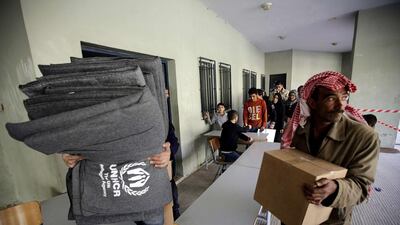SAADNAYEL, Lebanon // In Lebanon’s Bekaa valley, the sun is still shining. But soon temperatures will dip and snow will blanket fields that house hundreds of thousands of Syrian refugees.
Their shelters are little more than wooden frames covered with tarpaulins or, in some cases, plastic sacks sewed into patchwork quilt roofs.
The unofficial camps are on farmland, so the ground underfoot is soft, and quickly churns to mud at the first rainfall.
“Winter here is something terrible,” says Fatima Hanhoun, from Syria’s western Idlib province, who lives on a piece of land near Saadnayel in the Bekaa.
“Last year the ground was completely water laden, we couldn’t step outside the tents without sinking up to our knees in water and dirt.”
Even with the weather still warm, the conditions are dire.
A stream filled with rubbish and human waste separates the mini-camp in Saadnayel from the road.
The adults pick across it by stepping on semi-submerged bricks and an old carpet, but the children run through it barefoot.
The refugees wash in water from the stream but walk to a spring further away for drinking water.
An aid agency has installed a few communal toilets, strips of corrugated metal wrapped around squat holes on raised platforms.
But Ahmed, also from Idlib province, quietly describes how his disabled wife uses a plastic bag in their shelter as a toilet because she can’t climb the platform.
“We don’t blame anyone for our situation, we just hope for some help,” he says, pointing to the gaps in the tent where the wind blows in.
The United Nations refugee agency and a string of partner groups are trying hard to provide that help.
UNHCR has designated all refugees living in Bekaa, where the winter temperatures regularly fall below zero, to receive special winter supplies.
“There are 247,000 refugees registered in the Bekaa, and around 27,000 waiting to be registered,” says Lisa Abou Khaled, a public information assistant with UNHCR.
“All of them will get winterisation aid because all of them are classed as vulnerable because they are living above 500 metres.”
At a school in Saadnayel, dozens of men and women wait to receive a package that includes special “high-thermal” blankets.
They also receive ATM cards pre-charged with cash to allow them to purchase heaters and fuel.
Refugees are also getting reinforced tarpaulins designed to withstand heavy rain, floor mats and additional wooden beams.
Of the 250 camps in Bekaa alone, the UN believes 25 are particularly flood-prone. There they are raising shelters and digging canals to try to prevent disaster.
At the Dalhamiyeh campsite, also in Bekaa, many shelters have already been reinforced.
“Thank God, the UN is helping us. We’ve put up the extra plastic sheeting, and we have money for fuel and heating,” says Mahbuba Sarhan, 27, a mother of seven from Homs province.
“But I’m scared because there are reports that this winter will be the worst in a century, and the clothes we had for the children last winter are now too small for them.”
“Last winter, every time we wanted to go to the bathroom, we sank in the mud between the tents.”
Others are less impressed by the assistance.
“We have eight people living in this tent,” says Abdullah Hussein, who comes from Homs, gesturing towards a tiny makeshift shelter as he builds a wooden frame extension to it.
“All they gave me was these eight beams and a bit of plastic. How are we going to stay warm in that when it snows?”
For Ms Abou Khaled, the complaints are nothing new, and an understandable if frustrating part of an impossible job.
The Lebanese government opposes the establishment of formal refugee camps, so all that the UNHCR and other groups can do is try to ameliorate conditions at the unofficial ones the refugees have created.
“We’re not saying that we’re giving them five-star accommodation, but we are trying to make their situation liveable,” Ms Abou Khaled says.
At the Saadnayel camp, Ahmed Al Abd, 27, is preparing to pour concrete over a patch of ground next to his tent.
“I managed to get two days of work so I could buy these materials and do something to try to prepare for winter,” he says, accusing aid agencies of failing to bring winter materials to the camp.
“We’re all afraid of the winter, but going back home, to the bombing and the death, is much, much worse.”
* Agence France-Presse

